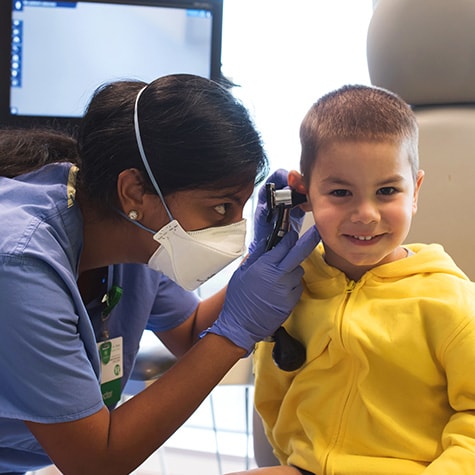Does My Child Need His Tonsils Removed?
Updated 9/4/21
If your child has a persistent sore throat or recurring tonsillitis and strep throat, your doctor may recommend a surgery known as a tonsillectomy to have their tonsils removed. If your child also snores at night and has pauses in breathing, this may indicate sleep apnea, and a tonsillectomy may be recommended.
Has your child been diagnosed with strep throat a lot, or have you caught him snoring at night? A tonsillectomy may help treat these issues.
A tonsillectomy refers to a type of surgery in which a child's tonsils are removed. Your child's doctor might recommend that your child have a tonsillectomy if he has a persistent sore throat, recurring tonsillitis or strep throat, as well as if he snores at night and has pausing in breathing.
“While the idea of your child undergoing surgery can be scary, tonsillectomies are one of the most common procedures performed by otolaryngologists, also referred to as ear, nose and throat or ENT doctors,” says Steven L. Goudy, MD, Medical Director of Otolaryngology at Children’s Healthcare of Atlanta. “At Children’s, we perform thousands of tonsillectomies each year.”
The ENT doctors at Children’s are specially trained to evaluate your child’s symptoms and will determine if a tonsillectomy is the best option to treat your child’s symptoms.

Tonsils are a collection of lymph tissue located on each side of the back of the throat that function as a defense mechanism against germs that enter the body.
“Tonsils help your body recognize normal and abnormal germs in your mouth,” explains Dr. Goudy. “When tonsils are infected, the condition is called tonsillitis.”
Tonsillitis can occur due to a bacteria or virus and sometimes is due to the bacteria Streptococcus A (group A strep throat). Both conditions can cause your child pain and discomfort and interfere with his body’s ability to recognize germs.
Tonsils are at their largest in 3- to 6-year-olds and smallest during the teen and adult years. While tonsils are part of the body’s immune system, studies show removing tonsils does not significantly affect their body’s ability to fight infection, which is why removing them can sometimes help certain children avoid conditions like strep throat or sleep apnea.
If your child is experiencing any of the following symptoms or conditions, your doctor may recommend a tonsillectomy:
- Snoring and obstructive sleep apnea: Blocked or interrupted breathing caused by the enlarged tonsils.
- Frequent tonsil infections: Usually six to seven in one year, or two to three a year for more than a few years
- Recurring throat infections or strep throat: Usually more than seven in one year, five of each in two years or three of each in three years
- Difficulty eating or swallowing
- Enlargement of one tonsil that may cause pain on one side of throat
A tonsillectomy is usually done as an outpatient procedure, which means your child will be able to go home the same day as surgery. The procedure is performed under general anesthesia, so your child won’t be aware of the surgery or experience pain during it. And because a child’s anesthesia needs are different, the pediatric anesthesiologists at Children’s are specially trained and experienced to tailor anesthesia and pain management for children and teens whose bodies are still growing. Our team creates a specialized anesthesia plan for each child based on their weight, height and type of surgery.
“The procedure itself entails our pediatric otolaryngologist removing the tonsils using a specialized surgical tool that uses heat, high-energy heat or sound waves to remove or eliminate tissues and help stop bleeding,” explains Dr. Goudy.

Some facilities can’t guarantee a pediatric anesthesiologist for your child—we do.
While some hospitals may not be staffed to meet this need, at Children’s, every baby, child and teen receives care from a pediatric anesthesiologist who understands best practices for growing bodies.
Learn moreAfter surgery, your child may temporarily experience the following symptoms:
- Upset stomach from being under anesthesia
- Low-grade fever (up to 101.5°F or 38.6°C is common for up to the first five days after surgery)
- White, yellow or gray patches in the back of the throat for up to two weeks after surgery, which is a normal sign of healing
- Ear or neck pain that typically stems from where the tonsils were and may last for up to two weeks
- Very bad breath that will improve as wounds heal (you can brush your child’s teeth, but it will not help the bad breath)
- Voice changes that usually go away in two or three weeks (your child’s voice may sound higher pitched, muffled or nasally)
- Small specks of blood coming from the nose or in the saliva (or spit)
- While some small specks of blood can be normal, bleeding can be very serious. Any amount of bright red blood, large clots or vomiting of blood is not normal. Call your child’s surgeon if any bleeding occurs, and the doctor will let you know what to do.
At Children’s, we perform thousands of tonsillectomies each year on kids from birth to age 18, so our team brings its pediatric expertise and years of experience to every procedure.

When it comes to your child, where you take them matters.
If your child has ear infections, strep throat or other issues that impact their ears, nose or throat, find a pediatric otolaryngologist or click the link below to schedule an appointment.
Make an AppointmentAdditional Resources
Steven Goudy, MD, is Medical Director of Otolaryngology at Children’s Healthcare of Atlanta, as well as Professor and Director of Pediatric Otolaryngology at Emory University School of Medicine. He joined Children’s in 2015 by way of Vanderbilt University Children’s Hospital, where he worked for 10 years following his fellowship training in pediatric otolaryngology.
This content is general information and is not specific medical advice. Always consult with a doctor or healthcare provider if you have any questions or concerns about the health of a child. In case of an urgent concern or emergency, call 911 or go to the nearest emergency department right away. Some physicians and affiliated healthcare professionals on the Children’s Healthcare of Atlanta team are independent providers and are not our employees.
Contact Us 404-785-KIDS (5437)







